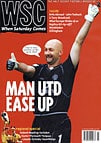 In an edited extract from his new book, Morbo, Phil Ball explains how Spain owes its patient style of football to an Englishman, Fred Pentland
In an edited extract from his new book, Morbo, Phil Ball explains how Spain owes its patient style of football to an Englishman, Fred Pentland
Fred Pentland came to manage Athletic Bilbao in 1923, following in the footsteps of another Englishman, a trained masseur by the name of Mr Barnes. The arrival of Pentland, who had played for Blackburn Rovers (among others) in the first decade of the century, coincided with the first clear signs of professionalism in the Spanish game. Pentland had been interned in Germany during the First World War and seems to have spent most of his time training German officers. In 1920 he managed the French football team at the Antwerp Olympics and then spent a year at Racing Santander, whereupon Athletic literally bought him from the Cantabrian club, offering him 1,000 pesetas a month – a decent sum in those days.
“Freddie” Pentland is revered in the club’s history, although it’s hard to decide whether that is due to his inspired management or because he embodied to perfection the idea of the eccentric English gentleman. He was known as bombín (bowler hat) and photographs suggest he was not so much eccentric as barking mad. Pentland’s first act at Athletic was to show the players how to tie their bootlaces correctly – “get the simple things right and the rest will follow” was apparently his motto. Pentland smoked big cigars and wore his bowler, even in training, but his contribution to Spanish football is not to be scoffed at. He is remembered above all as an advocate of the short-passing game, as opposed to the cruder style still embarrassingly referred to in Spain as “the old 1-2-3”.
Barcelona, halfway through the first league campaign of 1928-29, decided to adopt lo de Pentland (Pentland’s way), and won the title with it. Their stature in the game from 1928 onwards inevitably influenced others in adopting the “ball into feet” approach. That this system was associated with an Englishman seems something of an irony, and truth to tell it was more likely that Pentland had left England precisely because of his reluctance to play under the auspices of the big hoof. In 1923 Athletic won the cup playing the possession game but, after two trophyless years, opened a debate over which system should be adopted. Pentland, perhaps sensing problems, moved on to Oviedo.
When he returned to Athletic in 1929, his dedication to the passing game paid off more handsomely, and the Basques won the league in 1930 and 1931. In the latter season they pummelled Barcelona by the extraordinary score of 12-1, a result which remains the Catalans’ worst defeat. In Pentland’s last season in Bilbao, 1932-33, Athletic finished runners-up to Real Madrid and had clearly assimilated the notion that a more patient game, so characteristic of modern Spanish football, was the way forward.
Pentland’s idiosyncratic Spanish and his odd behaviour gave rise to a thousand anecdotes, many of which survive. The most famous phrase to be handed down to the present generations was the legendary: ¡Que poco te queda bombín. Sólo tres minutos! (Only three minutes left for you, bowler hat!). These words were first shouted from the dug-out three minutes from the end of Athletic’s legendary cup win in 1923 against the now defunct Catalan club Europa, in Barcelona’s old stadium Les Corts. The players had already begun a tradition of whipping Pentland’s hat off his head whenever they won a game, and ritually jumping up and down on it until it was no more. Pentland had an open credit scheme with a prestigious London hatter and optimistically ordered 20 a year.
In 1959 the club brought him over from England for an homenaje (homage). Bilbao’s San Mamés stadium was packed to the rafters and Pentland, grey and frail, kicked off the game between Athletic and Chelsea after Javier Prado, the president at the time, had pinned the club’s Distinguished Member medal on to his immaculate crombie. When Pentland died in 1962, in Dorset, Athletic held a ceremony at San Mamés which included an aurresku (high-kicking dance) in front of a small memorial. It’s a solemn ritual and reserved only for a select band of people considered to have contributed significantly to the culture. An orator then read out the first part of Pentland’s famous bowler-hat cry, “How little time is left for you”, in poetic reference to his death.
Pentland was clearly a maverick, a type never comfortably accepted in the British game. Lo de Pentland was obviously not lo de Inglaterra, but it’s nice that they thought it was. Those who recall the sublime aesthetic of Cruyff’s Barcelona Dream Team of the early Nineties should always remember that it owed something to a tradition stretching back to Pentland.
From WSC 169 March 2001. What was happening this month